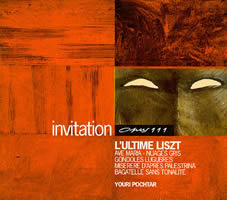Youri Pochtar’s late Liszt
|
Walt Mundkowsky [February 2011.]
“L’Ultime Liszt.” Franz LISZT: Late Piano Works (16). Youri Pochtar (p). Opus 111 B00000I4K9 (O/P, but copies are plentiful) (http://www.naive.fr/). The public phase of Liszt’s piano music does not engage me — noisily glib but surefire virtuosity, excesses an arena rocker could envy. But the exemplary outpouring of his last decade issued from a different kind of genius: haunted, mystical, largely reclusive. Freed of the urge to impress, he became an artist out far ahead. Nuages gris (1881) anticipated Debussy, while Bagatelle sans tonalité (1885) cleared the way before Schoenberg and Webern. Only now do we have the variety of approaches necessary to judge Liszt’s final achievements. This CD was central to that process. Youri Pochtar boasts an encompassing technique, as well as the intellect to grasp the music’s mercurial turns. His basically Romantic temperament doesn’t aspire to the tonal bleakness Brendel and Pollini have brought to this repertory. He seems strongly attuned to the atmosphere of Liszt’s sacred expression; the 9:19 Ave Maria (II) is both tender and ecstatic, and Miserere, d’après Palestrina balances elevation and heft. Like every Opus 111 disc I’ve heard, the sound (taken at Protestant Church St. Peter, Paris in 1993) is splendid — opulent and fully rounded, but in no way deficient in punch. Listen to the inconsolable bass fanfare in the Wagner memorial R.W. – Venezia (1883). The omission of its companion entry, Am Grabe Richard Wagners, hurts the sequence and me. Jos van Immerseel’s Zig Zag program on 1886 and 1897 Erards would top my personal heap in this area. Leslie Howard’s The Late Pieces (Vol. 11 in his Hyperion intégrale of the solo piano music) is the place to start. More briskly paced than Pochtar’s, it clocks in at 78:27 and features several rarities.
[More Walt Mundkowsky]
[More
Liszt]
[Previous Article:
Mostly Symphonies 16.]
[Next Article:
Armchair Operas 7.]
|
